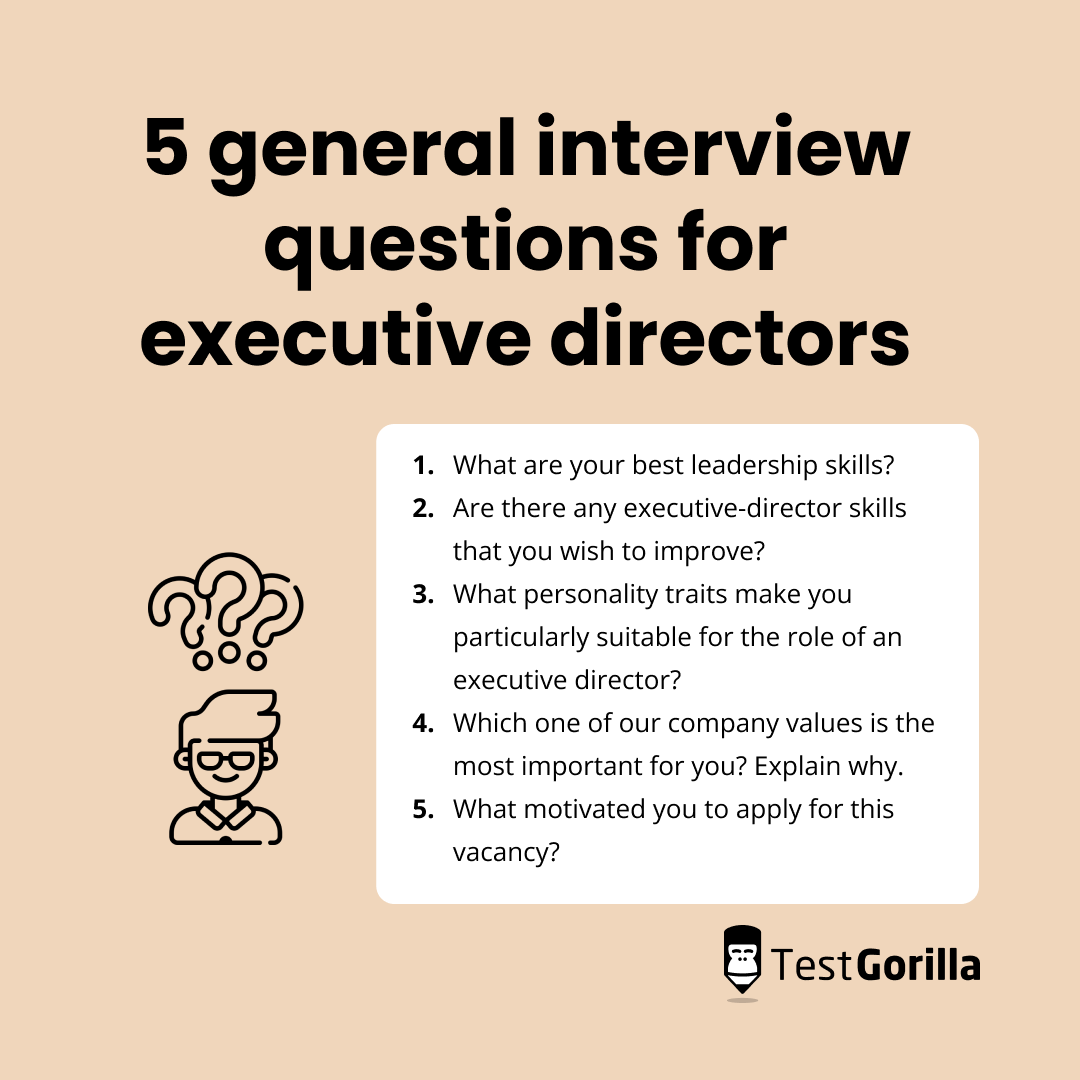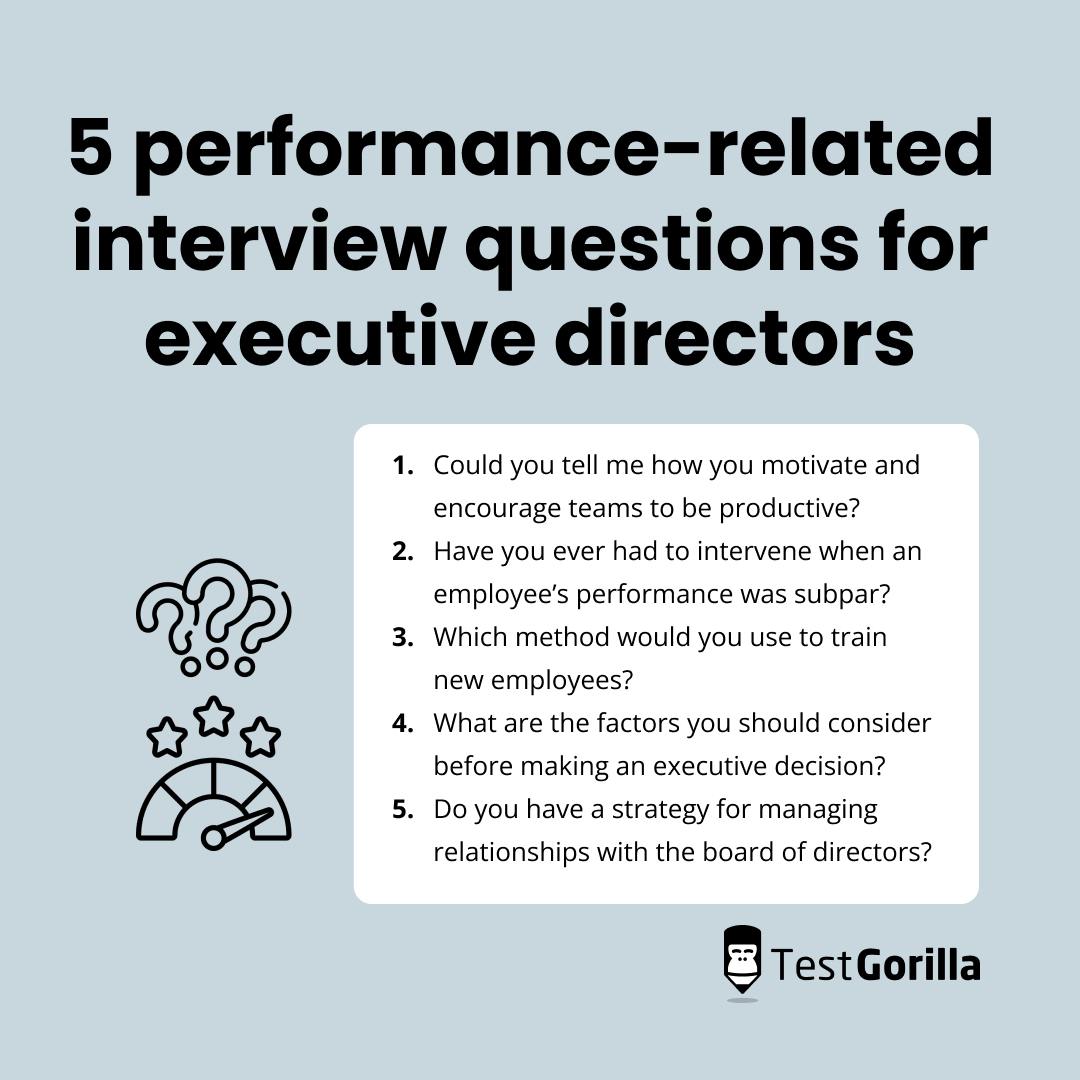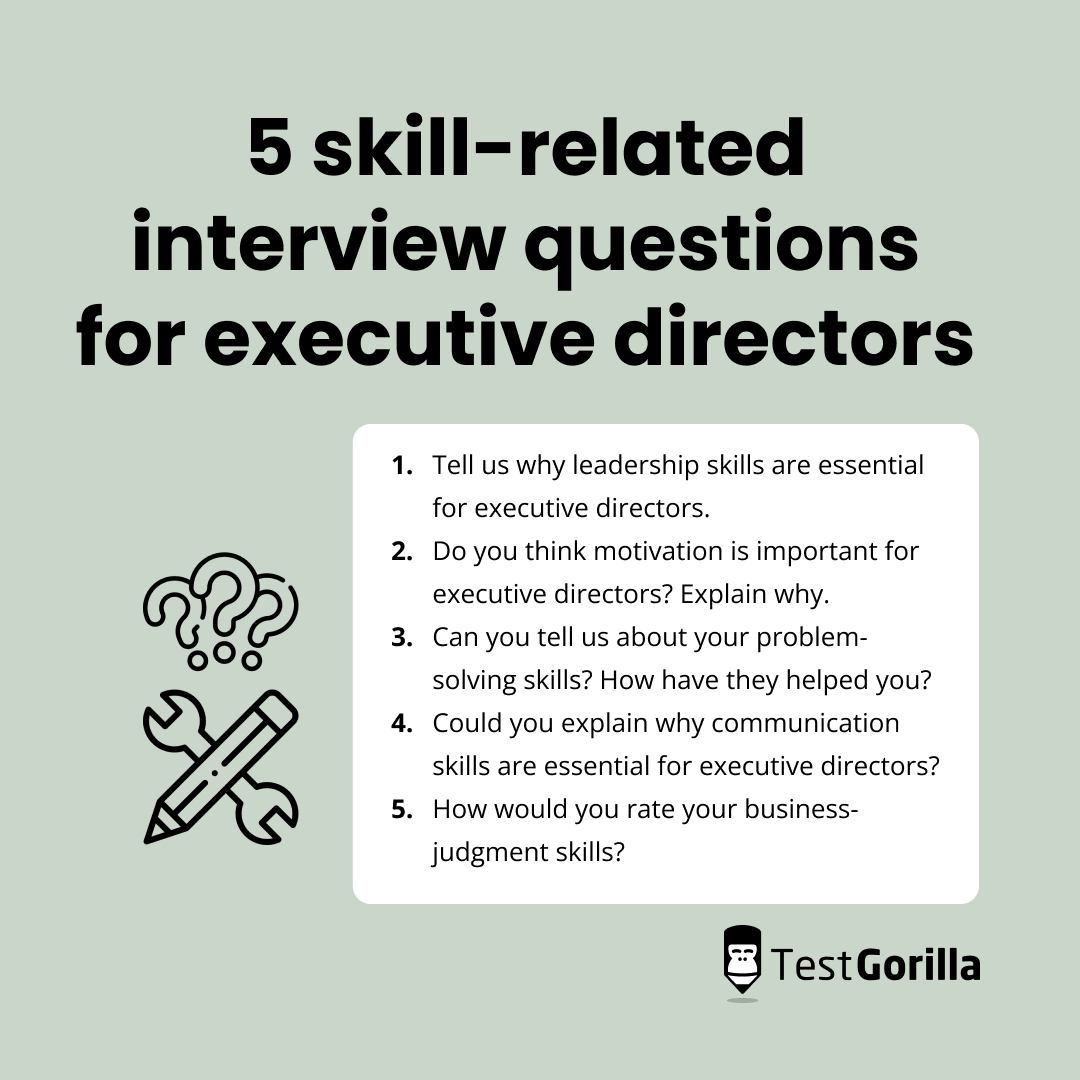60 insightful interview questions for executive directors
When hiring an executive director, evaluating candidates thoroughly is essential. Not only do they need advanced leadership skills and the right mix of personality traits for the role, but their values should be aligned with your company’s culture.
Where should you begin when assessing these factors?
The ideal starting point is to create a skills assessment featuring a Business Judgment test and a Leadership and People Management test and invite your candidates to complete it.
As soon as they finish the assessment, you simply need to check the results and invite the best candidates to an interview. Interviews give you an unique opportunity to learn more about applicants’ traits and skills – but for this, you need to have the right selection of questions for executive directors.
To help you, we’ve gathered 60 questions in this article. Choose from the lists below to begin your interview process.
Table of contents
- 17 general interview questions for executive directors
- 5 general interview questions for executive directors and sample answers
- 32 performance-related interview questions for executive directors
- 5 performance-related interview questions for executive directors
- 11 skill-related interview questions for executive directors
- 5 skill-related interview questions for executive directors
- At which stage of the hiring process should you use these interview questions for executive directors?
- Use the right interview questions for executive directors to hire an expert
17 general interview questions for executive directors
When interviewing for the role of an executive director, it’s a good idea to start with a few general interview questions to learn about candidates’ professional interests and skills. Use some of these 17 questions to achieve this.
1. What are your best leadership skills?
2. Are there any executive-director skills that you wish to improve?
3. What motivated you to apply for this vacancy?
4. Could you tell us if you’re reading any professional books related to leadership and people management?
5. Can you describe your leadership experience?
6. What would you like to achieve in the next six months?
7. What personality traits make you particularly suitable for the role of an executive director?
8. What is your philosophy of managing a team?
9. Explain why you want to lead this company in particular.
10. Which one of our company values is the most important for you? Explain why.
11. Can you describe your current responsibilities as an executive director?
12. Do you know what our biggest challenges are as an organization?
13. Who are the leaders that inspire you to achieve your goals as an executive director?
14. Do you follow any management magazines or websites?
15. Explain why your skills are ideal for this executive-director position.
16. Do you have any business-management qualifications?
17. Which one word would your board of directors use to describe you? Why?
5 general interview questions for executive directors and sample answers
To gauge the quality of your candidates’ responses, check the sample answers to these five general interview questions for executive directors.
1. What are your best leadership skills?
Assessing your candidates’ best leadership skills is vital to learning whether they would be an asset to your company. Not every applicant will mention the same abilities when responding to this question.
Some might explain that their communication skills are their best ability, helping them collaborate with stakeholders efficiently. Others could explain how their analytical thinking helps them solve problems.
Whichever ability your candidates mention, check if the skills align well with the duties of your organization’s executive-director role. You can also ask for examples of how these skills have helped them in their current role.
2. Are there any executive-director skills that you wish to improve?
Not every candidate will have the full range of skills required to be your next executive director, but they should aim to improve the skills they lack.
For example, if applicants think their business-judgment skills aren’t at the required level, they might want to take additional training courses or practice their decision-making abilities to improve.
Consider whether your company can offer applicants the right training or mentoring to help them hone their abilities and check if your candidates are motivated to learn.
3. What personality traits make you particularly suitable for the role of an executive director?
From conscientiousness to the ability to influence others, many traits can help executive directors complete their work. A conscientious leader may focus on achieving challenging goals, maintaining order, and being dependable. These sub-traits can help candidates strive for success.
The ability to influence others is also crucial for executive directors, helping them to:
Advocate for new changes
Guide teams and influence a company’s strategies
Improve performance
The best way to review your candidates’ responses is to consider if their traits match your role and company values. If efficiency is a key company value, you might want to hire a conscientious executive director.
You can also assess your candidates’ personality traits with a DISC Personality test to check for compatibility.
4. Which one of our company values is the most important for you? Explain why.
With this interview question for executive directors, you can check if your applicants have researched your company values. If they have, candidates can mention a value that aligns with their own and explain why they think it’s essential.
For instance, if a strong work ethic is an essential value for your organization, consider if your executive-director candidate can explain exactly why it’s important to them.
5. What motivated you to apply for this vacancy?
When they respond to this interview question, candidates should refer to the responsibilities of the role that most appealed to them – or the reasons why they were drawn to your company.
Some may talk about the company’s mission and vision and explain that they share its visionary outlook. Others might consider that the role’s challenging duties appealed to them.
Always listen out for responses that emphasize the candidate’s passion and excitement to join your organization and lead your team with enthusiasm.
The best insights on HR and recruitment, delivered to your inbox.
Biweekly updates. No spam. Unsubscribe any time.
32 performance-related interview questions for executive directors
Assessing your candidates’ performance strategies and achievements can help you determine if they are a good choice for a second interview. Ask them some of these questions to learn about their productivity.
1. Can you tell us which values help you lead a company?
2. Explain how you initially react to complex problems.
3. Is risk-taking important in an executive-director role? Explain why or why not.
4. Have you ever completed a project that required creativity?
5. Could you describe a time you failed as an executive director? What did you learn?
6. What method do you use to handle conflict between team members?
7. Tell us about your experience in developing strategic plans.
8. Which method would you use to handle a sudden decrease in revenue?
9. Could you tell me how you motivate and encourage teams to be productive?
10. What’s your leadership style?
11. How would you efficiently delegate duties to a team?
12. Have you ever received criticism from supervisors? How did you respond?
13. Could you describe a time you had to make a difficult professional decision?
14. Could you give me an example of an instance where you needed to solve a complex problem? Which method did you use?
15. Could you tell me how you would improve the company if hired for this role?
16. Do you have a method to measure your professional performance? Tell us about it.
17. Do you have a strategy for managing relationships with the board of directors?
18. Which method would you use to train new employees?
19. Have you ever had to intervene when an employee’s performance was subpar?
20. Can you tell us about your experience with budget planning and execution?
21. Could you describe your mentorship experience?
22. Have you ever had to persuade management to accept your idea?
23. What are the factors you should consider before making an executive decision?
24. Have you ever encountered difficulties explaining something to stakeholders?
25. Could you tell us about your experience with media interactions?
26. Do you have any strategies for increasing our social media reach?
27. Tell us how you meet your current organization’s fundraising goals.
28. Do you have a pitching strategy to help draw attention to our business?
29. Can you tell us how you manage your executive director duties?
30. Have you ever faced an ethical dilemma as an executive director?
31. Have you ever had to take action without all the required information?
32. Name a time you struggled to build professional relationships with other teams.
5 performance-related interview questions for executive directors
Here are five sample answers to the most essential performance-related interview questions for executive directors. Use them to evaluate your candidates’ experience and the depth of their responses.
1. Could you tell me how you motivate and encourage teams to be productive?
Motivating teams as a leader is essential, and your applicants should have several strategies to enhance productivity.
Many methods can yield good results, from implementing recognition systems and providing positive feedback, to offering monthly bonuses alongside professional training programs.
Consider whether your applicants’ strategies had significantly impacted their team’s performance and how. For example, some applicants’ motivation strategies might have improved the quality of their company’s products or led to an increased return on investment.
2. Have you ever had to intervene when an employee’s performance was subpar?
Since executive directors must manage teams and team members, they must also handle their team’s performance issues. It’s essential to assess the approach they would use to rectify poor performance to determine if they match your company’s strategies or improve on them.
Candidates might arrange a one-on-one meeting to discuss performance issues with the team member. They could also offer advice on the candidate’s errors to help them work more efficiently.
3. Which method would you use to train new employees?
Training employees is an essential part of the onboarding process and while executive directors might not be directly involved in learning and development initiatives, they should be well-aware of the different methods to use.
To learn how efficiently they can complete these duties, ask them this interview question. Proper orientation and training can enhance employee success, so it’s important to consider your candidate’s orientation strategies.
Some executive disorders might create new training programs and then adapt them to team members’ skills; others might mentor new employees or offer different upskilling opportunities that could lead to promotions.
4. What are the factors you should consider before making an executive decision?
Ideal applicants should have a step-by-step process to making executive decisions. Some essential methods they might use are to:
Gather all the facts and data
Use critical thinking to find potential strategies
Examine each strategy
Determine the pros and cons of each method
Consider the financial cost of each strategy
Make a decision after weighing up all factors
Decision-making and problem-solving skills are essential for making executive-level decisions, so consider our Problem Solving skill test to evaluate your candidate’s abilities and experience.
5. Do you have a strategy for managing relationships with the board of directors?
If candidates have experience working with a board of directors, this is a good sign that they can handle stakeholder management at your company. When reviewing applicants’ answers to this interview question, it’s essential to listen for specific actions that would help them achieve this goal.
From open, honest communication with stakeholders to active listening and engaging in discussions, many methods help have a good relationship with the board of directors.
Be sure to check whether the candidate had a smooth, trouble-free relationship with the board of directors at their previous company by asking the right follow-up questions.
11 skill-related interview questions for executive directors
Knowing about your applicants’ specific skills for an executive role can help you make the correct decision when hiring someone. Ask them these 11 skill-related questions to learn more about this.
1. Why is project management necessary for executive directors?
2. Could you explain why communication skills are essential for executive directors?
3. Why is active listening important for executive directors?
4. Tell us why leadership skills are essential for executive directors.
5. Do you think motivation is key for executive directors? Explain why.
6. Can you tell us about your problem-solving skills? How have they helped you?
7. Could you explain why critical-thinking skills are vital for executive directors?
8. Is time management essential for your current role? Can you explain why?
9. How would you rate your business judgment skills?
10. How important is having in-depth knowledge of business ethics and compliance for your current role?
11. Would you say you use strategic thinking when solving problems?
5 skill-related interview questions for executive directors
Refer to the sample answers to these important skill-related interview questions to gauge your candidates’ suitability for the role.
1. Tell us why leadership skills are essential for executive directors.
You should expect candidates to understand why leadership skills are essential for this role. Applicants should explain that strong leadership skills ensure the goals and culture of the business stay aligned and are a key driver of top team performance.
Candidates should also know that executive leadership is more than guiding a group. It requires a specific style of thinking and proactive behavior that helps the company implement innovative strategies for complex problems.
Need a way to assess your applicants’ leadership abilities? Check out our Leadership and People Management test for a data-driven approach to hiring.
2. Do you think motivation is important for executive directors? Explain why
Executive leaders empower and inspire teams, but only if they themselves have the motivation to achieve this. Motivation enables executives to be successful – and help the company succeed at the same time.
If you need to assess your applicants’ motivation levels, why not check out our Motivation skill test? This test will give you the data to quickly review your candidates’ drive and ambition.
3. Can you tell us about your problem-solving skills? How have they helped you?
Your applicants should have strong problem-solving skills to handle all kinds of issues. To test these skills, check whether your applicants can achieve good results with the help of an effective plan and good strategy execution.
For example, executives may spend 30% of their time handling staff issues. To manage these challenges, executives must use problem-solving skills to:
Support and guide their HR department
Solve training and development issues
Improve onboarding processes
You can test your candidates’ problem-solving skills by asking them more about past outcomes or also add some extra problem-solving interview questions. Alternatively, use our Problem-Solving test to review their abilities.
4. Could you explain why communication skills are essential for executive directors?
Communication skills are essential for executive directors and enable them to work efficiently with their board of directors, other stakeholders, and the company’s teams. With smooth communication, a company executive can:
Help everyone understand the business goals
Improve morale and enhance productivity
Help teams navigate change
Since poor communication from executive directors can harm professional relationships and the company’s reputation, check if your candidates have these skills.
The simplest way to review your candidates’ communication skills is to use our Communication skill test, which assesses written and verbal communication.
5. How would you rate your business-judgment skills?
Candidates for the executive-director role should have good business-judgment skills to ensure they can make the right choices for their business. They should also be able to make good judgment calls even when uncertain of the outcome.
Some sub-skills that applicants may have, which can help them make good decisions for a company, include:
Performance improvement skills
Innovation and strategy
Knowledge of company finances
These skills can help executives enhance the company’s performance and competitive ranking to help it outperform rival businesses, so make sure you test these abilities with a Business Judgment skill test.
At which stage of the hiring process should you use these interview questions for executive directors?
Alongside an efficient, data-driven skill testing process, our interview questions for executive directors can reveal which candidates have the optimum skills. However, for the best results it’s important to complete skill testing first.
Build a skill assessment with up to five tests and remember to include our Business Judgment and Leadership and People Management tests. This way, you’ll be able to easily shortlist the most skilled applicants based on test results (which you’ll see as percentages and star ratings).
After that, you just need to choose the most suitable interview questions from our list and invite applicants to an interview. Remember to use follow-up questions to get the full picture.
Use the right interview questions for executive directors to hire an expert
Now you have a full list of interview questions for executive directors. All that’s left is to create a skill assessment and send it to applicants. TestGorilla has the best range of Personality and Culture, Role-Specific, and Situational Judgment tests for a comprehensive candidate assessment process.
More than 9,000 companies have used TestGorilla’s skills tests to streamline hiring. Will yours be next? See for yourself how our platform can transform your recruitment process in a free trial or a live demo.
Hire the most talented applicant for the role of an executive director – the easy way.
You've scrolled this far
Why not try TestGorilla for free, and see what happens when you put skills first.





















